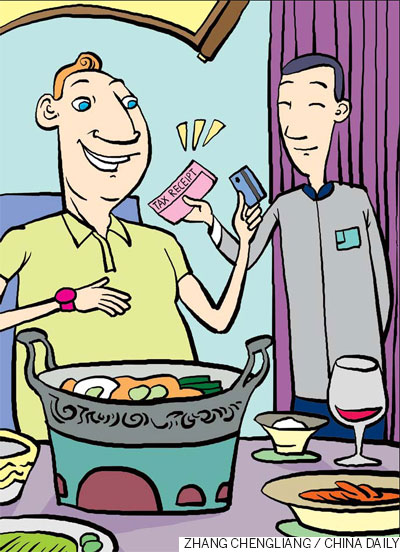Pulse
Tucking in for the greater good
By Earle Gale (China Daily)
Updated: 2011-05-10 08:02
 |
Large Medium Small |

Asking for tax receipts guarantees restaurants contribute their fair share to State coffers
Among the joys of life in Beijing are the many wonderful restaurants it has. I've been hitting them pretty hard on a near-daily basis ever since I arrived more than two years ago. I can count the number of bad meals I've had on one hand, and as well as dishing out tasty food, these restaurants are usually great value for money too.
Recently I've even managed to persuade myself that eating out is not so much a selfish act of gluttony but a service that helps China grow along with my waistline. The reason I can waddle out of a restaurant with my belt straining to hold in my increasing girth and still manage to convince myself that I pigged out for the good of the country is the fact I now ask at the end of each meal for a tax receipt, or fapiao.
It wasn't until several months after my arrival in the capital that I became aware of the existence of tax receipts, and it was many more months before I plucked up the courage to ask for one. Now I do it all the time.
The tax receipt is, I suspect, something many foreigners know nothing about. It's certainly not something a restaurant owner will hand you voluntarily - you need to ask. By asking, you ensure the restaurant forwards anywhere between 10 and 20 percent of the price of your meal to the government in taxes. If you don't ask, the restaurant owner may slip that cash into his back pocket and put it toward the cost of his next Audi or Swiss-made wristwatch.
It's a question of who you would prefer to see pocket that chunk of change. Call me a square if you like, but I've always been a big believer in taxes. They really are the only way countries can raise money. If everyone avoids paying them, how can nations improve, fill in those potholes, expand the education system and better equip those rural hospitals?
That 10 to 20 percent comprises several taxes, including an urban construction tax, a business tax, income tax and even one that goes toward children's education. The amount payable by the restaurant varies according to where it is, how big it is and what its monthly turnover is.
Since I started asking for tax receipts, I've noticed some restaurants are so intent on cheating the government that they hand out forged receipts. These invoices usually have a different name on the top and don't have the scratch-and-win box in the top-right corner. The box is a great way to check whether the tax invoice is genuine and gives you the added chance of winning some money.
I got really lucky a couple of weeks ago and scratched the box to find I'd won 50 yuan. The waiters were very excited for me and the manager even came over and told me I was the first person to win the top prize in his restaurant. I had to wonder whether that was because there is very little chance of winning or because hardly anyone asks for a tax receipt.
So, next time you go out for a nice meal, ask yourself whether you would rather see 10 to 20 percent of the money you just spent end up in the hands of the government or the restaurant owner. It may be a difficult decision in those eateries where you know and like the owner, but it might be an easier one if you find yourself chowing down in one of the capital's many profitable, foreign-owned fast food outlets. They too will give you a tax receipt if you ask for one and keep silent if you don't.
If you don't ask, you'll never know if they are contributing all they should be to improving the quality of life here.
The author is a copy editor at China Daily. To comment, e-mail metrobeijing@chinadaily.com.cn. The views expressed here do not necessarily reflect those of METRO.
Comment
(China Daily 05/10/2011)
| 分享按钮 |